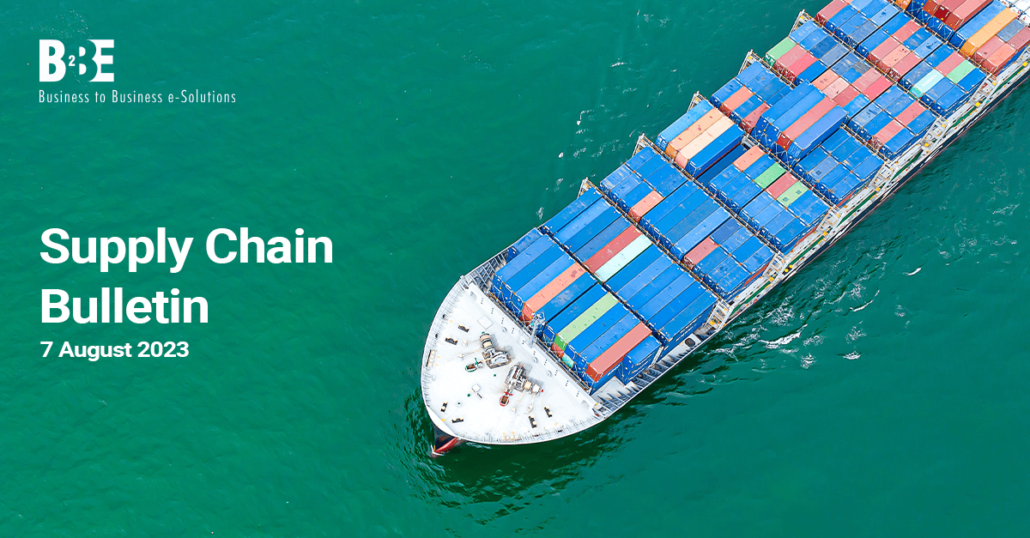This is your weekly supply chain bulletin from B2BE for the week starting 7th August 2023.
Each week, we bring you a rundown of the latest trends in the news from across the supply chain industry. We cover the issues most important to you, bringing you useful links to the full articles. This ranges from news on various supply chain disruptions to strategies to lessen the damage. We also include other relevant supply chain related updates. If you missed it, you can read last week’s supply chain bulletin here. Read on to see what’s making the news this week.
Renewables scale rapidly causing energy industry to face supply chain crunch
A survey conducted by Bureau Veritas among 800 energy industry leaders and market experts has found that 90% of respondents believe the energy sector will face challenges in growing and diversifying its supply chains as renewable energy deployment accelerates. The survey highlights concerns about supply chains being concentrated in certain geographies, making them vulnerable to shocks. Solar and semiconductor supply chains in China and wind supply chains are mentioned as examples that were impacted by Covid-19 lockdowns and energy price crises. Respondents also emphasized the need for improved supply chain management and highlighted the importance of fast-tracking the development of next-generation innovations. The survey also notes that there are challenges in recruiting and retaining skilled workers, particularly engineers and technical staff, as the demand for these roles grows rapidly in the energy transition.
Materials manufacturing in surge to renewables
Australia’s move towards renewable energy is raising concerns about the country’s ability to secure the necessary materials for infrastructure. Australian offshore wind company Oceanex is in need of a large supply of steel for its proposed offshore wind projects off the coast of New South Wales. The country’s lack of materials and manufacturing capability is highlighted by its declining ranking on the Harvard Economic Complexity Index due to its reliance on mining and farming. Energy companies, like Vestas, are seeking alternatives to Chinese suppliers due to political and economic challenges. The surge in renewable energy generation requires massive investments in local manufacturing and supply chains to become a reality, especially as the country is ranked 93rd out of 133 monitored countries in terms of manufacturing activity.
Manufacturers must learn to adapt with supply chain disruptions
Manufacturers are facing supply chain disruption and challenges in managing supply chain processes due to factors like inflation, cybersecurity, and external risks. Research shows that a large portion of companies are not adequately prepared for supply chain disruptions and need to increase their investments in capabilities that enhance resilience. Payhawk’s CEO and Co-founder, Hristo Borisov, suggests that manufacturers need to optimize cost control, spend visibility, and flexibility in the supply chain to navigate these challenges. He also emphasizes the importance of technology, automation, and spend management solutions to better handle supply chain complexities and enhance efficiency. Borisov notes that investing in technology can be more cost-effective than additional staffing and can lead to better decision-making and commercial growth.
Beverage business seeing supply chain resilience
Wine and spirits distributors are facing challenges in their supply chain due to complex traditional conveyor systems and labour availability issues. Robotic automation is emerging as a solution to improve efficiency, reduce costs, and enhance supply chain resilience. Beer and wine distributors are realizing the benefits of adopting robotic goods-to-person automation, which can increase picking and replenishment capacity, provide access to stored SKUs within minutes, optimize warehouse space, and eliminate the need for manual labour-intensive tasks. Robotic automation not only improves labour productivity and availability but also ensures businesses are well-equipped to meet market demands and adapt to the changing industry landscape.
About B2BE
B2BE delivers electronic supply chain solutions globally, helping organisations to better manage their supply chain processes, providing greater levels of visibility, auditability and control. We’re driven by a passion for what we do, inspired by innovation, and underpinned by a wealth of knowledge. With over 20+ years of experience, the B2BE teams operate worldwide.
For more information, visit www.b2be.com,
